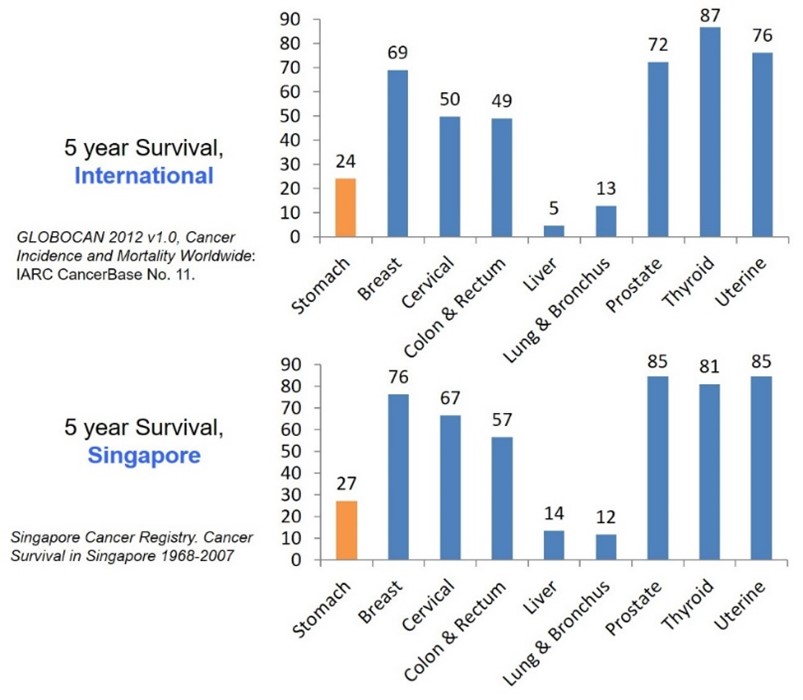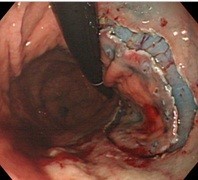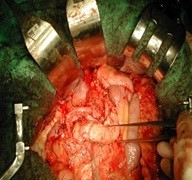Gastric Cancer
Stomach cancers cause approximately 800,000 deaths annually worldwide. In Singapore, stomach cancers are the 4th and 5th causes of cancer death in males and females respectively. Gastric cancer is curable if diagnosed at an early stage but it is traditionally associated with poor prognosis: 79% of patients are diagnosed at stage IV, where the five-year survival rate is less than 5%.
In order to constantly provide the most effective treatment options and improve the disease outcome, our team is active in conducting many clinical trials and have initiated several studies involving different centres and countries across the region.
 Sources:
Sources:
1. GLOBOCAN 2012 v1.0, Cancer Incidence and Mortality Worldwide: IARC CancerBase No. 11 [Internet].
Lyon, France: International Agency for Research on Cancer; 2010. Available from: http://globocan.iarc.fr, accessed on 26 Dec 2014
2. Singapore Cancer Registry Report 2015: National Registry of Diseases Office, Health Promotion Board; 2017.
3. Fong CWZ, Z; Chua, L; Ty, A. National Health Survey 2010. Epidemiology and Disease Control Division, Ministry of Health, Singapore; 2010.
Treatment
The choice of treatment will depend on the stage and type of cancer, position of cancer, patient’s age and general health. Gastrectomy surgery, radiotheraphy or chemotherapy are the different treatment options available.
Surgery is the most common treatment for gastric cancer especially when the tumour is confined to the stomach.
The most common treatment is called gastrectomy. There are two types:
Partial Gastrectomy: the removal of part of the stomach. The remaining portion of the stomach is then reconnected to the esophagus or the small intestine.
Total Gastrectomy: the removal of the entire stomach. The intestine is then reconnected directly to the esophagus. The lymph glands (nodes) close to the stomach will also be removed during the surgery.
If the cancer is too bulky to be removed, a connection will be made between the stomach and small intestine. This will relieve the symptoms but will not cure the cancer.
| EMR/ESD | LAPAROSCOPY | OPEN |
|---|---|---|
 |
 |
 |
Chemotherapy
Chemotherapy is the use of drugs to help kill cancer cells and shrink the size of the tumour. It can be given alone or combined with radiotherapy before or after surgery. It is also the treatment of choice if the patient is not suitable for surgery. The drugs are given into a vein or by mouth. Once the drugs enter the bloodstream, they spread throughout the body. In Stomach Cancer (Gastric Cancer), multiple chemotherapy sessions are usually required.
Radiation Therapy
Radiation therapy is a cancer treatment that uses high energy x-rays or other types of radiation to kill cancer cells or to keep them from growing. There are two types of radiation therapy – external and internal. The way the radiation therapy is given depends on the type and stage of the cancer being treated.
Radiation is usually administrated after surgery together with chemotherapy to kill very small remnants of the cancer that cannot be seen and removed during surgery. Radiation therapy can also be used to ease the symptoms of advanced Stomach Cancer (Gastric Cancer).
Research
In order to constantly provide the most effective treatment options and improve the disease outcome, our team is active in conducting many clinical trials and have initiated several studies involving different centres and countries across the region.
The Singapore Gastric Cancer Consortium (SGCC) is a multidisciplinary national research program comprising clinicians and scientists from academic medical centres, universities, and research institutes, with the aim of reducing incidence and morbidity of gastric cancer (GC).
Established in 2007, the SGCC has established itself over the past 10 years as an international leader in GC research. In this application, the SGCC seeks renewal of funding to further its goal of transforming GC management by tackling key clinical and scientific challenges in GC, through specific themes in precision prevention, precision therapy and identifying novel targets through innovative technologies, data science, and experimental models.
For novel therapy, our researchers have established a real-time genomic platform which provides a molecular classification that can predict both prognosis and drug responses. In addition, through the use of multiple gene expression platforms, this has led to the identification of new therapeutic targets that allow for specific targeted therapy. In addition, our researchers have also identified stomach cancer (gastric cancer) stem cells aiding in the understanding of the cancer biology and the development of new treatment processes.
Ongoing Research
- GCEP – GCEPII
Precision Prevention - Molecular identification of highest-risk IM patients
- Gastric Cancer Biomarker Discovery (GASCAD N-of-1 trial)
GC Stem Cell & Cell of origin
- Elucidate cells-of-origin in GI cancer
Precision Therapy
- Artificial intelligence in drug screening
- Non-invasive monitoring of GC Burden
- Single-cell landscape of primary and treated GSc
Recent Publications
- Induction of Gastric Cancer by Successive Oncogenic Activation in the Corpus.
Douchi D, Yamamura A, Matsuo J, Melissa Lim YH, Nuttonmanit N, Shimura M, Suda K, Chen S, Pang S, Kohu K, Abe T, Shioi G, Kim G, Shabbir A, Srivastava S, Unno M, Bok-Yan So J, Teh M, Yeoh KG, Huey Chuang LS, Ito Y.
Gastroenterology. 2021 Dec;161(6):1907-1923.e26. doi: 10.1053/j.gastro.2021.08.013. Epub 2021 Aug 12.PMID: 34391772
- Single-cell atlas of lineage states, tumor microenvironment and subtype-specific expression programs in gastric cancer.
Kumar V, Ramnarayanan K, Sundar R, Padmanbahan N, Srivastava S, Koiwa M, Yasuda T, Koh V, Huang KK, Tay ST, Ho SWT, Tan ALK, Ishimoto T, Kim G, Shabbir A, Chen Q, Biyan Z, Xu S, Lam KP, Lum HYJ, Teh M, Yong WP, So JB, Tan P.
Cancer Discov. 2021 Oct 12:candisc.0683.2021. doi: 10.1158/2159-8290.CD-21-0683. Online ahead of print
- Development and validation of a serum microRNA biomarker panel for detecting gastric cancer in a high-risk population.
So JBY, Kapoor R, ..., Chia CK, Tsao S, Shabbir A, .., Too HP, Yeoh KG.
Gut. 2021 May;70(5):829-837. doi: 10.1136/gutjnl-2020-322065.
PMID: 33028667 https://pubmed.ncbi.nlm.nih.gov/33028667/
- Severity of gastric intestinal metaplasia predicts the risk of gastric cancer: a prospective multicentre cohort study (GCEP).
Lee JWJ, Zhu F, .., So JBY, .., Teo YY, Teh M, Yeoh KG.
Gut. 2021 May 11:gutjnl-2021-324057. doi: 10.1136/gutjnl-2021-324057.
PMID: 33975867 https://pubmed.ncbi.nlm.nih.gov/33975867/
- Risk Prediction Model of 90-Day Mortality After Esophagectomy for Cancer.
D'Journo XB,.., So JB, .., Thomas PA, Low DE; International Esodata Study Group.
JAMA Surg. 2021 Sep 1;156(9):836-845. doi: 10.1001/jamasurg.2021.2376.
PMID: 34160587 https://pubmed.ncbi.nlm.nih.gov/34160587/
Chakrabarti J, Koh V, Steele N, Hawkins J, Ito Y, Merchant JL, Wang J, Helmrath MA, Ahmad SA, So JBY, Yong WP, Zavros Y.
Cancers (Basel). 2021 Dec 7;13(24):6158. doi: 10.3390/cancers13246158.
PMID: 34944780

